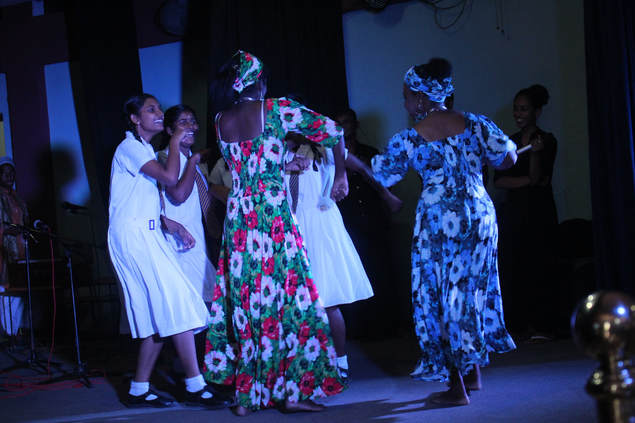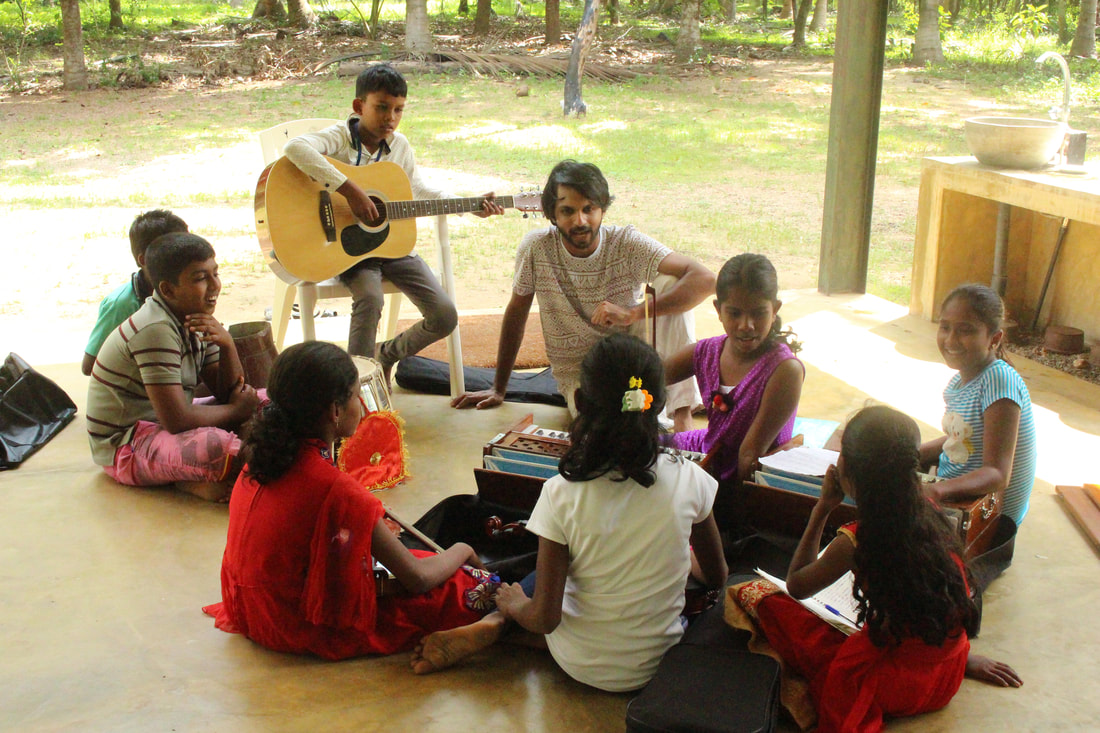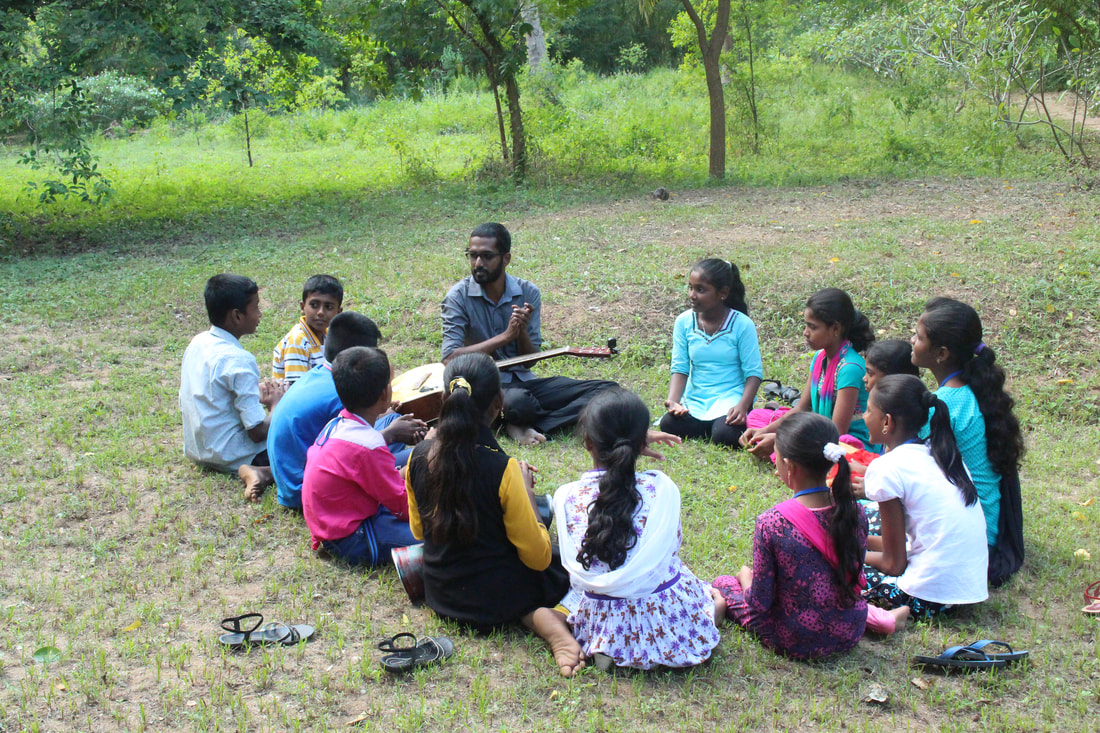 From July 3 to 7 folk artists representing the Ceylon Kaffir from; Sirambiadi (Puttalam), the Islamic Social Heritage Cultural Association - Sufi tradition from Akkaraipathu (Ampara), the Saranga Rookada Group from Ambalangoda (Galle), and the Portuguese Burgher Union from Batticaloa (Batticaloa), travelled 400 km from the West of Sri Lanka to the East, stopping in 5 schools in 3 districts, delighting children. They travelled together on a bus spending nights in Colombo, Anuradhapura and Batticaloa developing a close working relationship as a group and closer friendships as individuals. The School Concert Series was designed to foster a greater understanding amongst young children about Sri Lanka’s diverse cultural heritage in musical art forms, and develop closer relationships between folk artists from around Sri Lanka. The children listened to songs in: Sri Lankan-Portuguese Creole, in the haunting manjas sung by the Ceylon Kaffirs; Portuguese - “Baila” sung by Portuguese Burghers; dialects of Tamil in the devotional songs of the Sufis; and Sinhalese as the puppets entertained the children with the joker dance. Music cut through the language divide, with the common language of the musical beat and enjoyment going viral. Keeping true to the theme, the school concerts provided music for all. The folk artists had over the course of 5 months rehearsed together and, within their own group to craft a concert that linked their histories and cultures together, seamlessly moving from one tradition to the next as children watched enthralled. At each school a 45 minute concert was presented. The audience comprised of age groups from 10 – 16. The number in the audience varied according to the size of the hall. One concert was held outdoors, with the trees giving shade to the performers and audience. “We want more” the children yelled, when told it was time to say good-bye. At one school a student came on stage of her own accord, the teachers unable to hold her back. Addressing everyone she said with excitement “this was so nice. We liked everyone. We especially liked the Kaffir Manja, but we liked the other groups as well, but we would like to see the Kaffir manja perform again. Please bring us more exposure to different cultures from Sri Lanka as well as the rest of the World to our School again.” Having completed the concert the members of the Kaffir Manja group had changed out of costume, but when told of the request they were quick to say “give us 5 minutes we will get dressed and come out”. While they got ready, the Ambalangoda Rookada group showed a member of the audience how to skilfully manipulate the thread puppets (or rookada) to make him dance. In another school, a student said “we are so grateful for this opportunity to see these groups come to our school and perform that we would never have seen otherwise”. It wasn’t all entertainment. The students also asked incisive questions about the instruments used. The Kaffir Manja used household wares such as spoons and coconut shells to provide them with music. “Our ancestors were brought to this country as soldiers, and labourers, so they couldn't bring any instruments with them”, said a group member. “They used things you found around the house to make music. We are continuing this tradition. We want everyone to know there is music everywhere you look for it”. A teacher found that she had been pronouncing the words of the Portuguese songs wrong while teaching it to her students and promptly instructed the students to note the change. The Sufi group was thrilled that the students understood what they were singing and even when they weren’t understood the children erupted in cheers to the beat. For many of the artists the last concert in Colombo was their favourite; their 5th concert, and the last before they boarded the bus to travel 200 km to their next destination. “We decided that we would give it our all”, the artists said. At the end of the concert, the dancers collapsed laughing and exhausted back stage. There was a lot of energy to be drawn from the singing, swaying, dancing and the clapping audience. Having completed the 400 km journey and performances in 5 schools, the artists took their leave from each other, happy to have had such an experience with the school children and each other. “When is the next program?” – This was the question the artists and the school children had at the end of the series of concerts.
0 Comments
Sevalanka Foundation together with the Department of Education, Eastern Province and UNICEF is implementing a pilot research study on social cohesion. This project intends to use music as a tool as well as an alternative language which helps communicate and brings children from different communities together in harmony.
|
Annual ReportsAnnual Report | 2015 - 2016
Annual Report | 2014 - 2015 Annual Report | 2013 - 2014 Annual Report | 2012 - 2013 Annual Report | 2011 - 2012 Annual Report | 2010 - 2011 Annual Report | 2009 - 2010 Annual Report | 2008 - 2009 Annual Report | 2007 - 2008 Annual Report | 2006 - 2007 Annual Report | 2005 - 2006 Annual Report | 2004 - 2005 Annual Report | 2003 - 2004 Annual Report | 2002 - 2003 CategoriesArchives |



 RSS Feed
RSS Feed